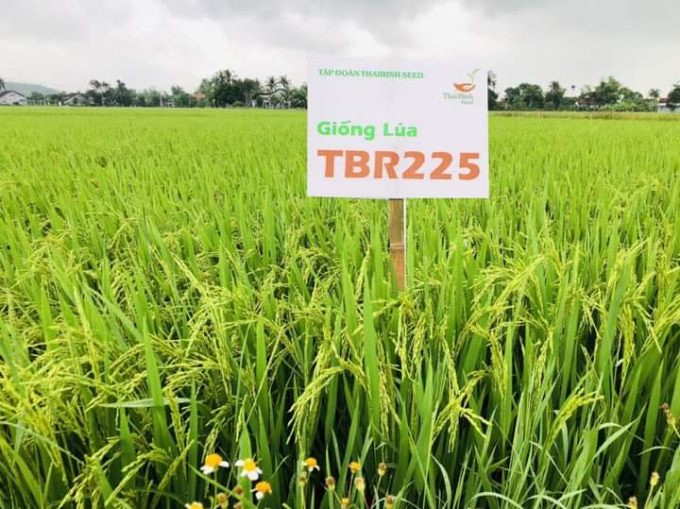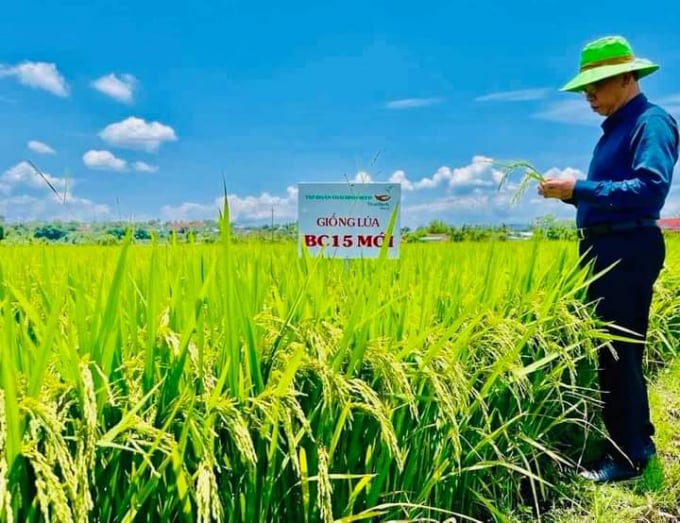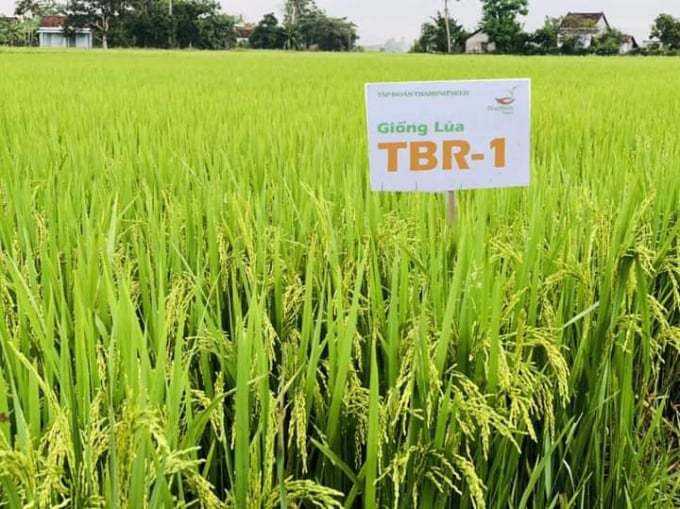December 5, 2025 | 11:27 GMT +7
December 5, 2025 | 11:27 GMT +7
Hotline: 0913.378.918
December 5, 2025 | 11:27 GMT +7
Hotline: 0913.378.918

Farmers in central region and Central Highlands region are interested in rice varieties made by ThaiBinh Seed. Photo: L.K.
ThaiBinh Seed Group Joint Stock Company (ThaiBinh Seed) – a major seeds and agricultural materials provider in Việt Nam was established in 1972 and has since then kept studying, selecting and introducing new rice varieties to farmers.
From trial and demonstration models to mass production, ThaiBinh Seed's rice varieties have always shown outstanding advantages.
Realizing the potential and benefits that ThaiBinh Seed's rice varieties could bring, farmers did not hesitate to choose its new rice varieties instead of traditional varieties.
In favourable or harsh weather conditions, ThaiBinh Seed's varieties can grow and develop well, bringing bumper crops.
In 2007, ThaiBinh Seed opened its branch in the central region and Central Highlands region. The move was not only an important step in the company’s development but also created a turning point for farmers in the land of sunlight and wind – the land with the harsh weather condition.
In the regions at that time, the efficiency of rice cultivation could not be as high as that in other parts of Việt Nam due to frequent natural disasters, pests and diseases.

Blast resitant BC15 has the same growth, yield and quality as the original variety but it also has good blast resistance.Photo: L.K.
ThaiBinh Seed’s Central region and Central Highlands branch has continuously introduced high-quality rice varieties which are well resistant to pests and diseases, well adapted to the climate and soil in provinces in the region.
The company's technical teams regularly visit rice fields, giving specific instructions to farmers on how to cultivate and fertilize properly so that the crop could develop the best.
As a result, rice productivity in the Central and Central Highlands provinces has been increasing. Many localities have a productivity of over 90 quintals per ha, which local farmers here have never seen before. From what they witnessed, they have fully trusted and used ThaiBinh Seed's rice varieties.
After only a few years, the rice area with rice varieties of ThaiBinh Seed is constantly expanding. Some varieties are selected as the main varieties for the provinces’ rice farming.
Since being introduced in central and Central Highlands regions, almost all rice varieties of ThaiBinh Seed have not received any complaints from users.
Currently, ThaiBinh Seed’s rice varieties such as TBR1, TBR225, BC15 and TBR97 are used widely in the regions.
Pham Duy Tan, director of Nhon Tho 2 Co-operative in An Nhon Town, Binh Dinh Province said that the co-operatives had used seeds made by ThaiBinh Seed for more than ten years.
The co-operative now has a total of nearly 200 ha of rice, producing more than 3.600 tonnes of rice yearly. One of the varieties that the co-operative use most is TBR1.
Tan said that with the variety TBR1, they could get the productivity of 70 quintals per ha in this year’s summer-autumn crop.
In winter-spring crop, in some fields, they got 500 kg per sào ( each sào equal to 500 sq.m), Tan said.

TBR1 variety is used widely in central region in the last ten years.Photo: L.K.
When it comes to ThaiBinh Seed’s rice varieties, BC15 has been highly praised thanks to its yield, quality and ability to cultivate in both two crops.
However, BC15 is vulnerable to get rice blast disease (level 7-9), so when it is grown in unfavourable weather, the productivity and output are reduced.
By 2017, the above disadvantage was removed when the Institute of Food Crops and Food Plants (Vietnam Academy of Agricultural Sciences) co-operated with ThaiBinh Seed to successfully transplant the rice blast resistance gene (pita) into the BC15 rice variety.
After tests in many locations for four years, results showed that the blast-resistant BC15 variety has the same growth, yield and quality as the original variety. Moreover, it also has good blast resistance.
Phan Khoi, a farmer in Dai Minh Commune, Dai Loc District, Quang Nam Province said that he used the BC15 variety for more than ten years as it had many advantages.
However, his rice used to get rice blast disease, so he had to use plant protection products, he said.
“As soon as hearing about blast resistant BC 15 variety, I shifted to use it,” he said, adding that he was very happy to see his rice grow well without getting the rice blast disease.
Another variety by ThaiBinh Seed – TBR225 is very popular in central regions, particularly in Quang Nam, Quang Ngai and Binh Dinh.
Ho Anh Tuan, a farmer in Dai Hoa Commune, Dai Loc District, Quang Nam Province said that the TBR225 was very suitable for the local soil.
It grew well and hardly got diseases, he said, adding that he got about 7 tonnes per ha in the summer-autumn crop and about 8.3-8.5 tonnes per ha in the winter-spring crop.
Trieu Tan Phu, Director of ThaiBinh Seed‘s Central region and Central Highlands branch said that to verify the adaptability, yield and quality of the varieties, for the past many seasons, the company has implemented demonstration models in many localities in the region with different soils.
The models all achieved good results, were highly appreciated by the participating households and people who witnessed them.
“Currently, TBR1, TBR225 and BC15 are the main varieties in Quang Nam, Quang Ngai and Binh Dinh provinces. Every year, the company supplies to the market about 600 tons of each type,” he said.
“To expand the production area, in the past two years, we have carried out demonstration models of these varieties in the provinces from Phu Yen to Ninh Thuan and the Central Highlands, all have seen positive results,” he added.
In the coming years, ThaiBinh Seed planned to bring more varieties of medium and short-term rice to people in the regions, particularly, the highly promising TBR97 variety, he said.
Translated by Hien Anh
/2025/12/01/2936-2-222331_70.jpg)
(VAN) Mortgaging his house and giving up a pharmaceutical management career, Mr. Nguyen Quang Duy succeeded in bringing Khanh Hoa's sea grapes to demanding markets such as Japan and the U.S.

(VAN) The large-scale agroforestry investment project aims to develop a leading sustainable agro-industrial center in Angola.
/2025/11/28/3433-1-212821_213.jpg)
(VAN) Many localities across the coconut land of Vinh Long are replicating emission-reducing models in production and daily life, contributing to the targets for emission reduction and green economic development.

(VAN) The green transition is an inevitable path for collective economy to achieve balanced growth and align with global trends.

(VAN) The TH Group is not only Vietnam’s leading clean-milk producer; it is also leaving a strong mark on sustainable development as it pursues the goal of carbon neutrality.
/2025/11/27/3830-1-152901_403.jpg)
(VAN) Dong Nai is developing its key crop areas, expanding planting area codes, and applying high technology to increase the value of agricultural products, aiming at a green and sustainable agriculture.

(VAN) Tay Ninh’s livestock sector is undergoing a major transformation, applying high-tech, closed-loop circular models to build sustainable value chains.